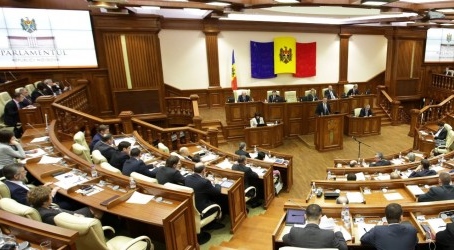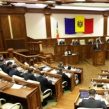
Russia’s Sympathizers in Moldova Oppose the European Choice
Publication: Eurasia Daily Monitor Volume: 11 Issue: 33
By:

The European Union and Moldova have set a fairly tight calendar for wrapping up their Association Agreement: signing it by August and ratifying it in the Moldovan parliament until November, when this parliament’s term expires. Moldova’s pro-Europe coalition government holds a narrow majority of 54 seats in the parliament of 101 seats. Following Russia’s victories against the EU in Armenia and Ukraine, the European Union’s stake on Moldova (as well as Georgia) has risen dramatically.
The accelerated time-table for signing and ratification implicitly challenges Russia and its sympathizers in Moldova to act faster. They are prepared to stop or delay the signing and ratification process, and can already be seen working toward that end both within and outside the parliament.
Pro-Russia forces will try to reduce the government’s parliamentary majority to a number that would not suffice for ratifying the agreements with the EU; or would cause the pro-Europe government to fall in a no-confidence vote even before it comes to ratification. In the electoral arena, Russia will undoubtedly support efforts to increase the number of its sympathizers in the new parliament soon to be elected. Operations seem already to be under way on both of those lines via Moldovan-born, Russia-based wealthy businessmen (see below).
In parliament, the pro-Europe governing coalition’s 54 seats include: 31 seats of the Liberal-Democrat Party (under party leader Vlad Filat and the current prime minister Iurie Leanca); 16 seats of the Democratic Party (under businessman Vlad Plahotniuc and parliament chairman Igor Corman); and 7 seats of the Liberal-Reformer Party. The Communist Party under former president Vladimir Voronin holds 34 seats (and is leading in the pre-election polls). Leftist Russophiles (formerly Communists) hold 7 seats, divided among three splinter factions; a Romanian irredentist faction (opposed to the pro-Europe government) holds 5 seats; and there is one independent deputy.
The arithmetic is complicated and sometimes unpredictable. Only the Filat-Leanca party is fully consistent and disciplined. Elsewhere, just a few deputies switching sides could decisively change the balance of power in parliament.
On February 14, two backbenchers from the governmental majority (Liberal-Democrat and Democratic Party, respectively) announced that they had been offered cash in order to defect, create an unaffiliated group in parliament, and join a “new political force.” According to reports throughout Moldovan media, the offer came from the wealthy financier Vyacheslav Platon, a successful “bank raider” (hostile takeovers of bank shares) in Russia and Moldova, who returned to Chisinau and intimated that he intends to run for parliament. Meeting with the parliament’s finance and economics committee, Platon recommended that Moldova should remain “neutral” between the European Union and Russia/Eurasia, and let “the citizenry” (i.e., a plebiscite) make that decision (Unimedia, February 14; Ziarul National, February 17; RFE/RL, February 19).
In parallel, the Nizhniy-Novgorod-based Renat Usatyi, a wealthy manufacturer of supplies for Russian Railroads, has also returned to Moldova, spending lavishly on philanthropies and shopping around for a political party. Usatyi also calls for a referendum to allow Moldova’s “people, not politicians” to choose between the European Union and the Russia-led Customs Union. He advocates for strategic partnership with Russia to reduce energy prices in Moldova and open more jobs for Moldovans in Russia. Usatyi’s stated goal is to win a few parliamentary seats, which [in Moldova’s deeply fragmented parliament] would “make it difficult to form a majority, either of the left or of the right.” He would also re-nationalize “most” state properties to reverse their corrupt privatizations. Although only in his mid-thirties, Usatyi advertises himself as a “Soviet-era product” to prospective voters and avers that his “views coincide with those of Russia’s leadership.” He or his handlers evidently feel that those propositions sell well politically in some parts of Moldova (Unimedia, February 14; ru1.md, moldova24.info, accessed February 18).
Russia and its local allies are already trying to change both the subject of debate and the locus of decision on Moldova’s external orientation. Instead of the EU-Moldova association agreement being submitted for ratification in parliament, the pro-Russia forces want the question of Moldova’s European orientation versus Russian/Eurasian orientation to be submitted to a plebiscite. By moving the decision-making authority away from parliament, the pro-Russia camp seeks to exploit the low public rating of the parliamentary institution as such. By adding the second option, pro-Russia forces hope to capitalize on public opinion trends, which show Russia (or the Russia-led Customs Union) catching up with the European Union in the preferences of Moldova’s voters in recent years (see EDM, February 19).
Short of a country-wide plebiscite (which they hope to bring about eventually), Russophile groups seek to precipitate local plebiscites on the question of Moldova’s European versus Russian (Eurasian, Customs Union) orientation. The Communist Party in principle supports a plebiscite (on this and other issues) but is not pushing for it out in front at this time.
Two smaller parties are most active in urging a plebiscite: the Party of Socialists under former deputy prime minister Igor Dodon (it holds three parliamentary seats as part of the Russophile Left—see above) and the recently created, extra-parliamentary Party of Regions, so titled because it targets specific districts with “Russophone” populations. The Party of Regions’ leader, Mikhail Formuzal, being the Gagauz autonomy’s chief executive official and member of Moldova’s central government, was among the main organizers of the February 2 plebiscite in the Gagauz autonomy. There, in a plebiscite with two options, a Soviet-sized majority of 99 percent voted in favor of Russia against the European Union (see EDM, February 5).
The Socialists and the Party of Regions have announced intentions to form initiative committees and gather signatures for local plebiscites on this issue. Such initiatives can only catch fire in districts with heavy “Russophone” populations, resilient Communist influence, or both—and if endorsed by locally elected administrative authorities. The government in Chisinau is tactfully working with those authorities to defuse such initiatives.




